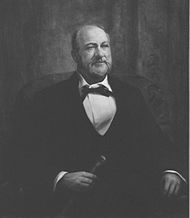Peter Turney
| Peter Turney | |
|---|---|

Portrait of Turney by Lloyd Branson
|
|
| 26th Governor of Tennessee | |
|
In office January 16, 1893 – January 21, 1897 |
|
| Preceded by | John P. Buchanan |
| Succeeded by | Robert Love Taylor |
|
Chief Justice of the Tennessee Supreme Court |
|
|
In office 1886–1893 |
|
| Preceded by | James W. Deaderick |
| Succeeded by | Horace H. Lurton |
| Personal details | |
| Born |
September 27, 1827 Jasper, Tennessee |
| Died | October 28, 1903 (aged 76) Winchester, Tennessee |
| Resting place | Winchester City Cemetery Winchester, Tennessee |
| Political party | Democratic |
| Spouse(s) | Cassandra Garner (1851–1857, her death) Hannah Graham (m. 1858) |
| Relations | Hopkins L. Turney (father) |
| Profession | Attorney |
| Religion | Episcopalian |
| Military service | |
| Allegiance |
|
| Service/branch |
|
| Years of service | 1861–1865 |
| Rank |
|
| Commands |
|
| Battles/wars |
American Civil War • Bull Run (1861) • Shenandoah Campaign (1862) • Seven Days (1862) • Peninsula Campaign (1862) • Fredericksburg (1862) |
Peter Turney (September 22, 1827 – October 19, 1903) was an American politician, soldier, and jurist, who served as Governor of Tennessee from 1893 to 1897. He was also a justice on the Tennessee Supreme Court from 1870 to 1893, and served as the court's Chief Justice from 1886 to 1893. During the Civil War, Turney was colonel of the First Tennessee Regiment, one of the first Tennessee units to join the Confederate Army.
As governor, Turney ended the state's controversial convict lease system and enacted other prison reform measures. His second term was marred by the 1894 gubernatorial election, which he won only after the state's Democratic-controlled legislature threw out thousands of votes for his opponent, Henry Clay Evans.
Turney was born at Jasper, Tennessee, the son of Hopkins L. Turney and Teresa Francis. His father was a prominent politician who was elected to the United States Senate in 1845 with the help of the Andrew Johnson-led "Immortal Thirteen." Shortly after Peter's birth, the Turneys moved to Winchester, Tennessee. He attended public schools in Franklin County and a private school in Nashville, and read law, initially with his father, and later (after his father was elected to the Senate) with Judge W.E. Venable. After his admission to the bar in 1848, he practiced in Winchester.
A strong Southern Democrat, Turney campaigned for John C. Breckinridge in the presidential race of 1860, and called for immediate secession after Abraham Lincoln's victory. In February 1861, he was the pro-secession candidate from his district for a proposed state convention at which Tennessee would have considered the secession issue (his pro-Union opponent was future governor Albert S. Marks). When Tennessee voters rejected this convention and upheld the state's ties to the Union, Turney spearheaded a movement that called for Franklin County to secede from Tennessee and join Alabama.
...
Wikipedia
